小升初英语四大时态复习讲解及真题专项练习含答案
【译林版专用】小升初英语语法复习讲义——四大时态(含答案)

小升初寒假专题-------- 四大时态辨析知识点梳理一般现在时用法A. 区分祈使句和一般现在时句型(Eg: 祈使句:Bobby, don’t be sad. 一般现在时:Bobby isn’t sad.)B. 自然规律。
(Eg: the earth goes around the sun.)C. 主语和with词组并列时,遵循就远原则。
(Eg:She with her friends goes swimming every day.)D. 按照计划,规定或者时间表行事。
(The plane takes off at 6 p. m.)E. 当主语是who; which; what等;将其看成第三人称单数。
(Who makes the room messy?)注意:一般现在时中的频率副词可分为模糊频率副词和精确频率副词模糊频率副词:always; usually; often; seldom; hardly; never精确频率副词:twice a week; once a week; three times a week对频率副词提问: How often对次数提问:How many times时间状语1. every 系列2. 频率副词3. On Sundays(表示每一个星期日)基本句型肯定句:主语+ 动词(注意第三人称单数)+ 其他否定句:主语+ don’t / doesn’t动词原形+ 其他(注意:当动词是do时,否定句一定是doesn’t do / don’t do)一般疑问句:Does/ Do + 主语+ 动词原形+ 其他?特殊疑问句:特殊疑问词+ 一般疑问句(Does/ Do + 主语+ 动词原形+ 其他?)现在进行时A. 表示这一阶段正在进行的动作。
(标志词:these days)We are preparing for the coming exams these days.B. 一些动词没有现在进行时。
人教PEP英语小升初时态专项复习卷(含答案)
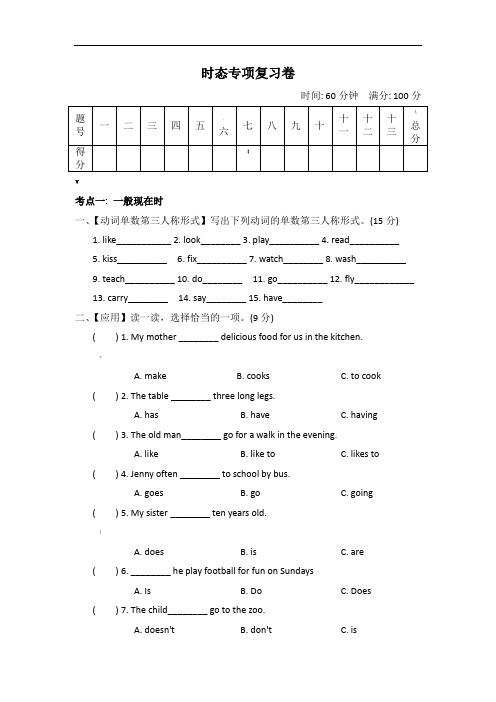
时态专项复习卷时间: 60分钟满分: 100分¥考点一: 一般现在时一、【动词单数第三人称形式】写出下列动词的单数第三人称形式。
(15分)1. like___________2. look________3. play__________4. read__________5. kiss__________6. fix__________7. watch________8. wash__________9. teach__________ 10. do________ 11. go__________ 12. fly____________13. carry________ 14. say________ 15. have________二、【应用】读一读,选择恰当的一项。
(9分)() 1. My mother ________ delicious food for us in the kitchen.>A. makeB. cooksC. to cook() 2. The table ________ three long legs.A. hasB. haveC. having() 3. The old man________ go for a walk in the evening.A. likeB. like toC. likes to() 4. Jenny often ________ to school by bus.A. goesB. goC. going() 5. My sister ________ ten years old.{A. doesB. isC. are() 6. ________ he play football for fun on SundaysA. IsB. DoC. Does() 7. The child________ go to the zoo.A. doesn'tB. don'tC. is() 8. The sun ________ in the east every day.A. riseB. risesC. rising()9. He________his teeth, ________ his face and then ________ breakfast.…A. brush; wash; haveB. brushes; washes; haveC. brushes; washes; has三、【句型练习】按要求完成下列句子。
小升初英语四大时态复习讲解及真题专项练习含答案
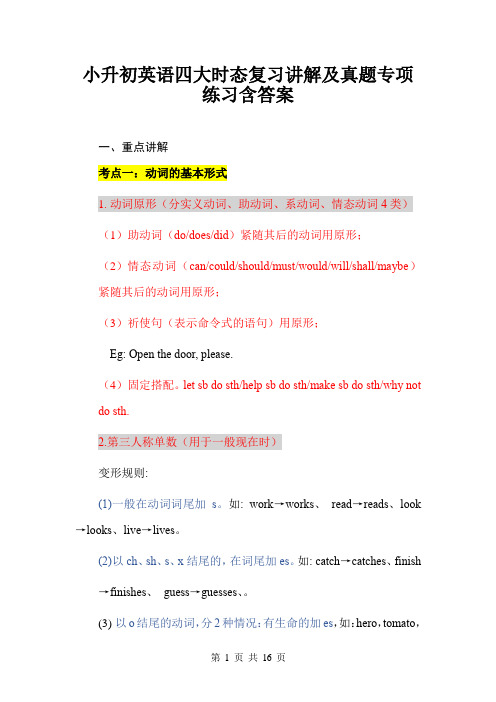
小升初英语四大时态复习讲解及真题专项练习含答案一、重点讲解考点一:动词的基本形式1.动词原形(分实义动词、助动词、系动词、情态动词4类)(1)助动词(do/does/did)紧随其后的动词用原形;(2)情态动词(can/could/should/must/would/will/shall/maybe)紧随其后的动词用原形;(3)祈使句(表示命令式的语句)用原形;Eg: Open the door, please.(4)固定搭配。
let sb do sth/help sb do sth/make sb do sth/why not do sth.2.第三人称单数(用于一般现在时)变形规则:(1)一般在动词词尾加s。
如: work→works、read→reads、look →looks、live→lives。
(2)以ch、sh、s、x结尾的,在词尾加es。
如: catch→catches、finish→finishes、guess→guesses、。
(3)以o结尾的动词,分2种情况:有生命的加es,如:hero,tomato,potato;没有生命的加s,如:radio,photo。
(4)以辅音字母加y结尾的动词,变y为ies。
如: fly→flies、study →studies、carry→carries.(5) 不规则变化。
如: have→has ,are→is,were→was3.现在分词(用于现在进行时)变形规则:(1)一般在动词后加ing。
如: work→working、read→reading、look →looking、wait→waiting。
(2)以不发音的e结尾的动词,去掉e,再加ing。
如: smile→smiling、move→moving、take→taking、write→writing。
(3)以重读闭音节结尾的且词尾只有一个辅音字母的,双写这个辅音字母加ing。
如: sit→sitting、stop→stopping、cut→cutting、run →running、swim→swimming.(4)少数几个以ie结尾的动词,将ie改为y加ing。
小学英语四大时态总结(附小升初时态考题)

4. 以o结尾的单词: 有生命加s 。
tomato-tomatoespotato-potatoes无生命加espiano-pianosphoto-photoszoo-zoosradio-radios小升初时态专题综合训练1.(成都市青羊区小学毕业卷)John _____ football.A. likes playingB. likes playC. like play2.(深圳市龙岗区小学毕业卷)Does your mother _____ football?A. likeB. likesC. like play3.(芜湖市第三中学招生卷)They usually _____ TV in the evening.A. watchB. will watchC. are watchingD. watches4.(上海市奉贤区小学毕业卷)—What do you usually do on the weekend?—I often ____.A. do my homeworkB. did my homeworkC. doing my homework5. (杭州市西湖区小学毕业卷)I don’t like _____ thril lers(恐怖片)______ playing baseball.A. watching; orB. watching; andC. to watch; or6.(菏泽市晨曦中学招生卷)Bob often _____ to school.A. walkB. walksC. walked7.(南昌铁路一中初中部招生卷)My pen ______ on my desk ten minutes ago.But it _____ there now.A. is; isn’tB. was; isn’tC. is; is8.(长沙市宁乡县小学毕业卷)Mike is _____ after his classmates.A. runsB. runingC. running9.(桂林市奎光学校招生卷)Be quiet! The babies ________.A. sleepB. are sleepingC. slept10. (武汉市青山区小学毕业卷)______ he _____ his homework yesterday?A. Does; doB. Did; didC. Did; do11(北京市朝阳区小学毕业卷)—What did you do last weekend?—I ______.A. go swimmingB. did my homeworkC. went swim12.(芜湖市第十一中学招生卷)—What’s your hobby?—_____ is my hobby.A. Collecting stampsB. Collect stampsC. Stamps13.(广州市白云区小学毕业卷)—Where were you just now?—I _____ at school.A. isB. wasC. were14.(武汉市青山区小学毕业卷)______ he ______ his grandparents lastmonth?A. Did; visitedB. Did; visitC. Do; visited15.(郑州市二七区小学毕业卷)Last week, we _____ a _____ race.A. hard; runningB. have; runningC. had; running16.(福州市仓山区小学毕业卷)I______ to the park last week.A. goB. wentC. going17.(合肥市蜀山区小学毕业卷)If I _____ you tomorrow, I will give youthe receipt(收据)。
小升初英语时态专项复习及答案
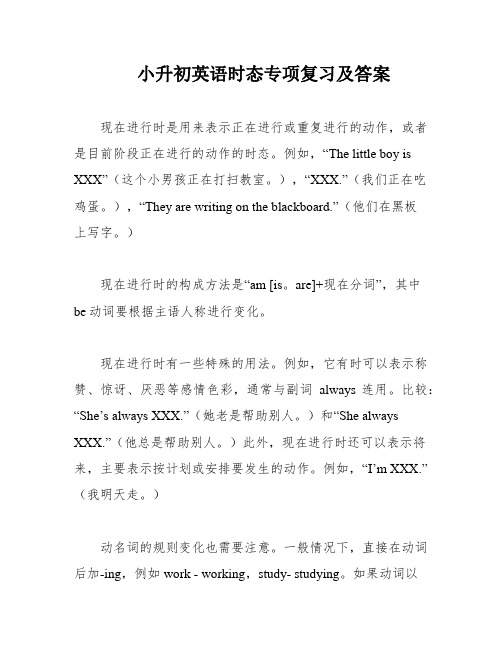
小升初英语时态专项复习及答案现在进行时是用来表示正在进行或重复进行的动作,或者是目前阶段正在进行的动作的时态。
例如,“The little boy is XXX”(这个小男孩正在打扫教室。
),“XXX.”(我们正在吃鸡蛋。
),“They are writing on the blackboard.”(他们在黑板上写字。
)现在进行时的构成方法是“am [is。
are]+现在分词”,其中be动词要根据主语人称进行变化。
现在进行时有一些特殊的用法。
例如,它有时可以表示称赞、惊讶、厌恶等感情色彩,通常与副词always连用。
比较:“She’s always XXX.”(她老是帮助别人。
)和“She always XXX.”(他总是帮助别人。
)此外,现在进行时还可以表示将来,主要表示按计划或安排要发生的动作。
例如,“I’m XXX.”(我明天走。
)动名词的规则变化也需要注意。
一般情况下,直接在动词后加-ing,例如work - working,study- studying。
如果动词以不发音的-e结尾,要去-e加-ing,例如take- taking,make-making。
对于重读闭音节的动词,若末尾只有一个辅音字母,要双写辅音字母,再加-ing,例如cut - cutting,put -putting。
以-ie结尾的动词要把变成y再加-ing,例如lie-lying,die - dying。
现在进行时的真题再现包括“Look!XXX XXX.”(瞧,孩子们正在踢足球。
)和“Look。
XXX XXX down from the tree.”(瞧,小熊猫正在从树上下来。
)1.XXX is XXX.2.I am watching TV right now.3.She is working in a hospital.4.Kitty and Ben are having XXX XXX.5.His father is able to help them.6."Danny。
(完整版)小升初英语总复习----四种时态专项训练(精编)
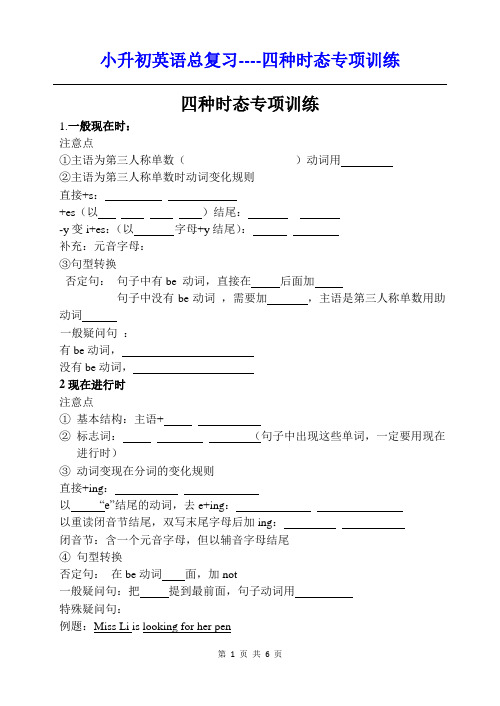
四种时态专项训练1.一般现在时:注意点①主语为第三人称单数()动词用②主语为第三人称单数时动词变化规则直接+s:+es(以)结尾:-y变i+es:(以字母+y结尾):补充:元音字母:③句型转换否定句:句子中有be 动词,直接在后面加句子中没有be动词,需要加,主语是第三人称单数用助动词一般疑问句:有be动词,没有be动词,2现在进行时注意点①基本结构:主语+②标志词:(句子中出现这些单词,一定要用现在进行时)③动词变现在分词的变化规则直接+ing:以“e”结尾的动词,去e+ing:以重读闭音节结尾,双写末尾字母后加ing:闭音节:含一个元音字母,但以辅音字母结尾④句型转换否定句:在be动词面,加not一般疑问句:把提到最前面,句子动词用特殊疑问句:例题:Miss Li is looking for her pen①②对①进行提问:对②进行提问:3一般过去时:注意点④句型转换否定句:主语+ (没有be动词)主语+ (有be动词)一般疑问句:以开头(没有be动词)以开头(有be动词)特殊疑问句:特殊疑问词+ + + ?(没有be动词)例题翻译:你家过去在哪里?4,一般将来时注意点①基本结构:主语+②标志词:next+年,月,日③句型转换:否定句:在be动词面加not他下周打算去公园吗?(一般疑问句)他下周打算去哪里?(特殊疑问句)④翻译:下周它将会是:_________ did you ________ the birds?2. Then, he let the boy go.(改为否定句)Then,he _______ ________ the boy go.3. They could play football.(改为一般疑问句,并作肯定回答)----________ they play football? ----Yes, they _________.4. Nancy lives in Nanjing now.(用last year 改写句子)Nancy _______ in Nanjing last year.5.I went to a shopping centre last Sunday.(改为一般疑问句,并作否定回答)---______ you ______ to a shopping centre last Sunday? ---No, I _________.6. He puts his things in order. (改为一般疑问句)___________________________________________________7. Did you go to bed late last night? (改为陈述句)____________________________________________________8. They often do their homework in the evening. (用she替换they)____________________________________________________9. You should put your books and toys on the floor. (改为否定句)_____________________________________________________10. He feels sleepy in the morning. (对划线部分提问)____________________________________________________11. This is Bobby’s bedroom. (对划线部分提问)____________________________________________________12. have, my, time, breakfast, I, always, on (.) (连词成句)____________________________________________________.13. The, out, the, get, lion, mouse, helped (.) (连词成句)____________________________________________________. 14. A monkey woke the tiger up.(改成一般疑问句)__________________________________________________15. Sam brings some water.(改成否定句)__________________________________________________16. Mike has some bread and milk for breakfast. (对划线部分提问)__________________________________________________17. The man sings well. (对划线部分提问)18. too, you, cola, much, drink, shouldn’t (.) (连词成句)______________________________________________________20 The children must play football on the road.(改为否定句)______________________________________________________ 21. We must look out for the traffic lights first.(对划线部分提问)______________________________________________________ 22. An old woman is crossing the road.(对划线部分提问)______________________________________________________ 23. You can’t watch TV now because it’s late. (对划线部分提问)______________________________________________________ 24. keep, desk, tidy, I, must, my, clean, and (.)(连词成句)______________________________________________________二用所给词的适当形式填空1.Let (we )(play) basketball this afternoon.2. (Be)your sister (visit) your parents tomorrow?3.Yang Ling is going to (make) clothes for her dolls.4. (child) Day is on the first of June.5. Tim usually (brush) his teeth in the morning.6.I (have) a birthday party last year.7.Tomorrow is Dragon Boat Festival. We (watch )a dragon boat race.8. They (eat) moon cakes last Mid-Autumn Festival?9.My parents ( watch) TV in the living room now.10. Your birthdayis coming. I (make) a cake for you.11.Let’s(play) the piano together.12.How many ( visit) are there in your group?13.My sister wants ( learn) about in England.14.My uncle is from ( Chinese).15.Animal ( love) will go to see them quickly.16.Jack (go )and look for his parents next week.17. (visit) from the US are very friendly.18.The girls ( learn) an English song next week.19.The students are very (excite).Because the game is very (e xcite).20.My mother likes ( listen)to music after dinner.21.He ( read) a book last night.22.Lucy is going to ( find) a book about e- cards.23.I (eat) some bread for breakfast yesterday.24.Can I ( have) an English book?25.We (are) twelve years old last year.26.I want (buy )a computer.27.What ( be) your parents going to do this weekend?28.We (fly) kites tomorrow.29.The boy ( come) to my house the day after tomorrow.30.What about (go )for a picnic next week?31. Mary’s birthday is next Monday, her mother (give) her a present.32.My mother ( buy) some snacks and drinks this morning.33. (Be) your family going to climb the hill next Sunday?34.Now, Bobby ( wear) his new clothes.35.This lesson (end) at half past eleven. Then you can have lunch.35. It is very cold these days . It (snow) tomorrow.36.-- You ( come here again next Saturday?---No. I (visit) my teacher.37.Hurry up! or we (be )late.38.--What you ( do) tomorrow afternoon?--I (see )a film with my friend.39.---Can you come and ( help )me with my English ,mum?。
小升初英语复习专题——时态(含答案)

6.have h__a_s_____ 7.see _s_e_e__s___ 8.come c_o_m__e_s___ 9.watch w_a__tc__h_e_s_ 10.eat _e_a__ts____
ha_v_i_n__g___
se__e_in__g___ co_m__i_n_g___ w__a_t_c_h_i_n_g e_ating_______
行
他).
时
一般疑问句:Am/Is/Are+主语
Is he watching TV now? 他现在在看电视吗?
+动词-ing(+其他)?
2.现在进行时的基本用法 用法
例句
当句子中有 now 时,常表示动作正在进行, 这时要用现在进行时。
They are dancing now. 他们现在正在跳舞。
is going/will go
【解析】 解答此类题要抓住关键词。 第1题中关键词为now,应用现在进行时,又因主语为I,be动词应 用am。 第2题由yesterday morning可知应用过去时,get的过去式为got。 第3题由sometimes可知应用一般现在时,Tom为第三人称单数,应 用help的第三人称单数helps。 第4题由next week可知应用将来时,将来时有两种情势“be going to”与“will+动词原形”。
我明天去。
Will he come? 他(会)来吗?
Where shall we meet? 我们在哪见面?Fra bibliotek单项选择。
( )1.—Does Lucy watch TV every evening? —________. A.Yes, he does B.Yes, he doesn't C.Yes, she does D.No, she does
小升初英语专项复习讲与练- 时态 通用版(word版,含答案)
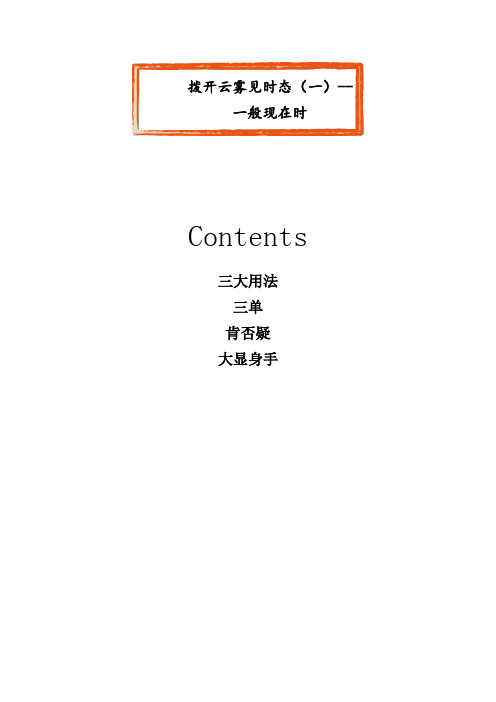
拨开云雾见时态(一)--一般现在时Contents三大用法三单肯否疑大显身手一般现在时三大用法规律性的动作 Xiao Fan has three bowls of rice for dinner on Fridays.Da Qiang sleeps with the duck every day.现在的状态 I am a teacher.You are a student.He is a policeman.There is a snake.真理 The sun is bigger than the earth.The earth travels around the sun.三单动词第三人称单数变化规则一般:加s二般:以s、x、ch、sh、o结尾,加es三般:以辅y结尾,变y为i加es四特:have→has三单使用条件不是我,不是你,并且只有一个肯定句、否定句、疑问句I am a teacher. He is 30 years old. We are clever.I am not a dancer. He is not 13 years old. We are not stupid. Are you a teacher? Is he 30 years old? Are you clever?I eat 2 eggs every day.I don’t eat 2 eggs every day.Do you eat 2 eggs every day?She eats 20 eggs a week.She doesn’t eat 20 eggs a week.Does she eat 20 eggs a week?大显身手1.We often ___________ (play) in the playground.2.He _________ (get) up at six o’clock.3.Danny (study) English, Chinese, Maths, Science and Art at school. 4.She often __________ (watch) TV with her dog.5.__________ you_________ (brush) your teeth every morning?6.What (do) he usually (do) after school?1.I have many books. (改为否定句)__________________________________________2.Da Shan’s sister likes playing table tennis. (改为否定句)__________________________________________3.I watch TV every day. (改为一般疑问句)__________________________________________4.Yu Paopao is the cleverest student in her class. (改为否定句)__________________________________________Keys:1.play 2.gets 3.studies 4.watches 5.Do, brush 6.does, do 1.I don’t have many books.2.Da Shan’s sister doesn’t like playing table tennis.3.Do you watch TV every day?4.Yu Paopao is not the cleverest student in her class.测试题一、写出下列动词的第三人称单数形式get ________________ sit ________________come ________________ drive _________________fly _________________ study _________________wash _________________ watch _________________go ________________ do _________________二、单项选择1.Where _________ he _________ from?A.is, come B.do, comeC.does, come D.are, from2.We _____________ any Chinese cla sses on Friday.A.don’t has B.doesn’t haveC.don’t have D.are have3.Wang Mei __________ music and often ___________ to music.A.like; listen B.likes; listensC.like; are listening D.liking; listen4.Jenny ____________ in an office. Her parents ____________in a hospital.A.work ; works B.works ; workC.work ; are working D.is working ; work三、句型变化1.Tony watches TV every evening. (改为否定句)_________________________________________.2.Amy likes playing computer games. (改为一般疑问句) _________________________________________?3.Sun Yang washes clothes on Saturday.否定句: __________________________________一般疑问句: ______________________________肯定/ 否定回答 __________________ / __________________Keys:一、gets si ts comes drives fliesstudies washes watches go es does二、CCBB三、1. Tony doesn’t watch TV every evening.2. Does Amy like playing computer games?3. Sun Yang doesn’t wash clothes on Saturday.Does Sun Yang wash clothes on Saturday?Yes, he does. / No, he doesn’t.拨开云雾见时态㈡-- 一般过去时Contents肯否疑动词过去式大显身手一般过去时描述过去发生的事肯定句、否定句、疑问句I was in a quiet street.I was not in a quiet street.Was I in a quiet street? (Were you in a quiet street?)I had a dream last night.I didn’t have a dream last night.Did I have a dream last night? (Did you have a dream last night?) 动词过去式变化规则动词过去式,ed来结尾一般直接加,见e只加d辅y结尾y变i,再加ed重读辅元辅,双写尾字母常见不规则动词过去式大全am, is→wasare→werecut→cuthit→hitlet→letput→putcost→costhurt→hurtread→readfeel→feltmeet→metsmell→smeltfi nd→foundget→gothave→hadhold→heldmake→madesell→soldtell→toldcome→came become→becamerun→ranlearn→learned/learnt hear→heardwin→woncatch→caught teach→taughtbring→broughtbuy→boughtthink→thoughtfly→flewthrow→threwgrow→g rewknow→kneweat→atefall→fellgive→gavetake→tooksee→sawwrite→wroteride→rodedrive→drovebuild→builtlend→lentsend→sentspend→spentlose→lostpay→paidsay→saiddraw→drewshow→showed speak→spokebreak→brokesteal→stolewake→woke choose→ch ose forget→forgotsleep→sleptsweep→sweptstand→stoodunderstand→understoodbegin→beganring→rangsing→sangswim→swamdrink→drankdo→didgo→wentsit→sat时间标志词yesterday …ago last… the day before yesterday just now this morning i n 2008大显身手1.There _________ (be) no one here a moment ago.2.Helen and Nancy _________ (be) good friends, but now they are not. 3.I listened b ut ___________ (hear) nothing.1.How is Jane yesterday? ________2.He go to school by bus last week. ________3.I can fly kites seven years ago. ________4.Did you saw him j ust now. ________5.Tom wasn't watch TV last night. ________6.I did not my homework yesterday. ________Keys:1.was 2.were 3.heard 1.is→was2.go→went3.can→could4.saw→see . →?5.wasn’t→didn’t6.did not后面加do测试题一、写出下列动词的第三人称单数形式、过去式形式go_______ _______ enjoy_______ _______buy_______ _______ like_______ _______get _______ _______ walk_______ _______take_______ _______ dance_______ _______ write_______ _______ run_______ _______swim_______ _______ find_______ _______begin_______ _______ eat_______ _______play_______ _______ study_______ _______ 二、单项选择1.I ______________ my room last Sunday.A.cleaned B.clean C.am cleaning D.cleans2.What ______________ Mike do last weekend?A.do B.does C.is D.did3.______________ you ______________ TV last night.A.Do, watch B.Did, watch C.Did, watched D.Does, watches 4._____________ he ____________ football two days ago?A.Does, play B.Did, played C.Did, play D.Does, playing 5.They _______________ on a trip in February, 2007.A.are going B.going C.went D.goes6.She watered the flowers _______________.A.tomorrow B.sometimesC.yesterday morning D.every morning7.Mike_____________ a big tiger in the nature park last year.A.saw B.see C.seeing D.seen8.------ Good afternoon, Miss Lee. How does Mike feel?------ He’s tired. H e ____________ a lot of work ______________ .A.does, this morning B.do, this morningC.did, this morning D.have, this morning三、找出以下短文中的动词过去式,并将其对应的动词原形写出来The City Mouse and the Country MouseOnce there were two mice. They were friends. One mouse lived in the country; the other mouse lived in the city. After many years the Country mouse saw the City mouse; he said, "Do come and see me at my house in the country." So the City mouse went. The City mouse said, "This food is not good, and your house is not good. Why do you live in a hole in the field? You should come and live in the city. You would live in a nice house made of stone. You would have nice food to eat. You must come and see me at my house in the city."The Country mouse w ent to the house of the City mouse. It was a very good house. Nice food was set ready for them to eat. But just as they began to eat they heard a great noise. The City mouse cried, " Run! Run! The ca t is coming!" They ran away quickly and hid.After some time they came out. When they came out, the Country mouse said, "I do not like living in the city. I like living in my hole in th e field. For it is nicer to be poor and happy, than to be rich and afraid."Keys:goes went enjoys enjoyed buys bought eats ategets got walks walked takes took dances danced writes wrote runs ran swims swam finds found begins began likes likedp lays played studies studied ADBC CCACwere arelived livesaw see拨开云雾见时态㈢-- 一般将来时Contents肯否疑will、be going to大显身手一般将来时描述将来发生的事肯定句、否定句、疑问句Tigers will be a kind of vehicle.Tigers will not be a kind of vehicle. (will not=won’t)Will tigers be a kind of vehicle?Cars will run everywhere.Cars won’t run everywhere.Will cars run everywhere?时间标志词tomorrow soon from now on in the future next+ in+be going to两大用法1 打算做某事I’m going to be a si nger.She is going to learn French.2 根据现象作出推断It’s going to rain.She is going to faint. (她要晕了。
2019版小升初英语时态专项复习(知识梳理、真题及练习)(Word版,14页,含答案)
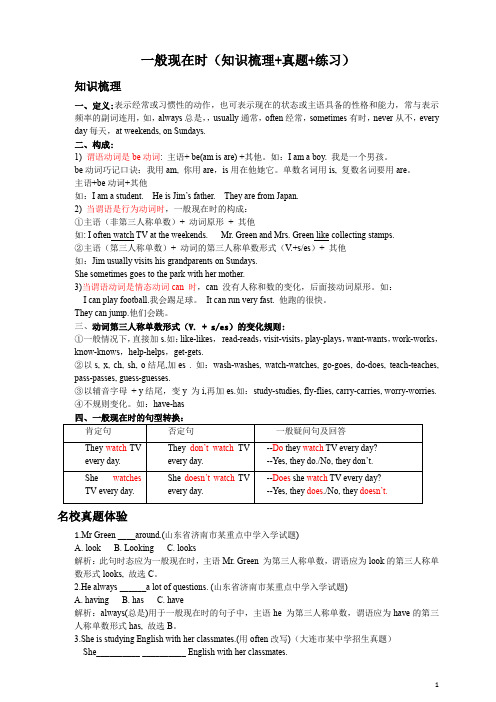
一般现在时(知识梳理+真题+练习)知识梳理一、定义:表示经常或习惯性的动作,也可表示现在的状态或主语具备的性格和能力,常与表示频率的副词连用,如,always总是,,usually通常,often经常,sometimes有时,never从不,every day每天,at weekends, on Sundays.二、构成:1) 谓语动词是be动词: 主语+ be(am is are) +其他。
如:I am a boy. 我是一个男孩。
be动词巧记口诀:我用am, 你用are,is用在他她它。
单数名词用is, 复数名词要用are。
主语+be动词+其他如:I am a student. He is Jim’s father. They are from Japan.2) 当谓语是行为动词时,一般现在时的构成:①主语(非第三人称单数)+ 动词原形+ 其他如: I often watch TV at the weekends. Mr. Green and Mrs. Green like collecting stamps.②主语(第三人称单数)+ 动词的第三人称单数形式(V.+s/es)+ 其他如:Jim usually visits his grandparents on Sundays.She sometimes goes to the park with her mother.3)当谓语动词是情态动词can 时,can 没有人称和数的变化,后面接动词原形。
如:I can play football.我会踢足球。
It can run very fast. 他跑的很快。
They can jump.他们会跳。
三、动词第三人称单数形式(V. + s/es)的变化规则:①一般情况下,直接加s.如:like-likes,read-reads,visit-visits,play-plays,want-wants,work-works,know-knows,help-helps,get-gets.②以s, x, ch, sh, o结尾,加es . 如:wash-washes, watch-watches, go-goes, do-does, teach-teaches,pass-passes, guess-guesses.③以辅音字母+ y结尾,变y 为i,再加es.如:study-studies, fly-flies, carry-carries, worry-worries.④不规则变化。
人教PEP英语小升初时态专项复习卷(含答案)
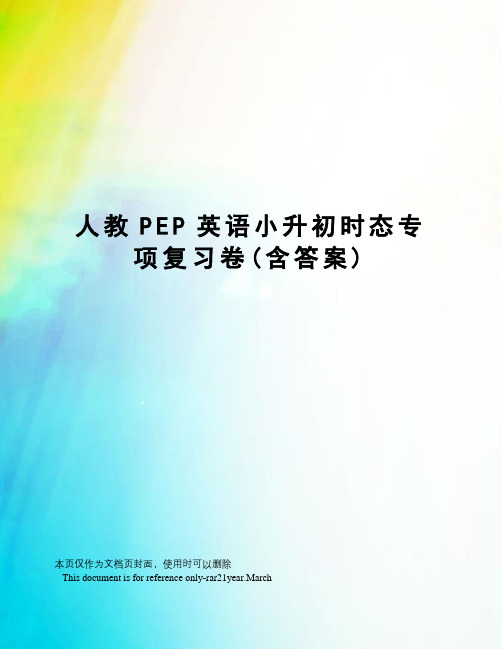
人教P E P英语小升初时态专项复习卷(含答案)本页仅作为文档页封面,使用时可以删除This document is for reference only-rar21year.March时态专项复习卷时间: 60分钟满分: 100分考点一: 一般现在时一、【动词单数第三人称形式】写出下列动词的单数第三人称形式。
(15分)1. like___________2. look________3. play__________4. read__________5. kiss__________6. fix__________7. watch________8. wash__________9. teach__________ 10. do________ 11. go__________ 12. fly____________13. carry________ 14. say________ 15. have________二、【应用】读一读,选择恰当的一项。
(9分)() 1. My mother ________ delicious food for us in the kitchen.A. makeB. cooksC. to cook() 2. The table ________ three long legs.A. hasB. haveC. having() 3. The old man________ go for a walk in the evening.A. likeB. like toC. likes to() 4. Jenny often ________ to school by bus.A. goesB. goC. going() 5. My sister ________ ten years old.A. doesB. isC. are() 6. ________ he play football for fun on Sundays?A. IsB. DoC. Does() 7. The child________ go to the zoo.A. doesn'tB. don'tC. is() 8. The sun ________ in the east every day.A. riseB. risesC. rising()9. He________his teeth, ________ his face and then ________ breakfast.A. brush; wash; haveB. brushes; washes; haveC. brushes; washes; has三、【句型练习】按要求完成下列句子。
小学英语小升初复习时态四大时态的综合、导图及训练 动词时态练习及答案
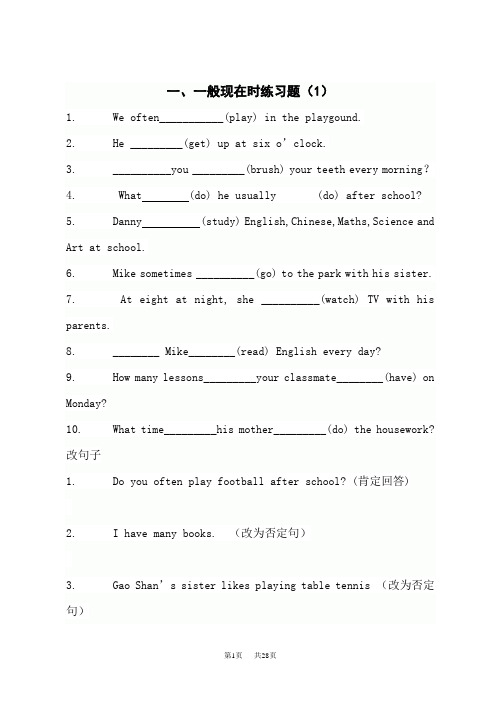
一、一般现在时练习题(1)1. We often___________(play) in the playgound.2. He _________(get) up at six o’clock.3. __________you _________(brush) your teeth every morning?4. What (do) he usually (do) after school?5. Danny (study) English,Chinese,Maths,Science and Art at school.6. Mike sometimes __________(go) to the park with his sister.7. At eight at night, she __________(watch) TV with his parents.8. ________ Mike________(read) English every day?9. How many lessons_________your classmate________(have) on Monday?10. What time_________his mother_________(do) the housework? 改句子1. Do you often play football after school? (肯定回答)2. I have many books. (改为否定句)3. Gao Sha n’s sister likes playing table tennis (改为否定句)4. She lives in a small town near New York. (改为一般疑问句)5. I watch TV every day. (改为一般疑问句)6. David has a goal. (改为一般疑问句)7. We have four lessons.(否定句)8. Nancy doesn’t run fast (肯定句)9. My dog runs fast.否定句:一般疑问句:10. Mike has two letters for him.一般疑问句:否定句:11. I usually play football on Friday afternoon.一般疑问句:否定句:一般现在时练习(2)1. He often (have) dinner at home.2. Daniel and Tommy (be) in Class One.3. We (not watch) TV on Monday.4. Nick (not go) to the zoo on Sunday.5. they (like) the World Cup?6. What they often (do) on Saturdays?7. your parents (read) newspapers every day?8. The girl (teach) us English on Sundays.9. She and I (take) a walk together every evening.10. There (be) some water in the bottle.二、现在进行时练习1、I _______________________( look for) a shirt, I’m looking fora tie.2、They ______________________( plant) flowers in the yard now.3、Miss Baker _________________( drink) milk in the cafeteria now.4、What are you _________(do) now? I ___________(eat) bread.5、It’s nine o’clock. My father_______________(work) in the office.6、Look, the boy____________(put) the rubbish into the bin.7、__________he__________(clean) the classroom? No, he isn’t. He____________(play).8、Where is Mak? He___________(run) on the grass.9、Listen, who____________(sing) in the music room? Oh, Mary_____________(sing) there.10、Who_______(sing)a song? ----Li Ying is.现在进行时练习(2)1、写出下例动词的现在分词形式1)give____ 2)use____ 3)clean____ 4)skate____ 5)draw____ 6)tell____ 7)do____ 8)write____ 9)get____ 10)put____ 11)take____ 12)stop____ 13)speak____ 14)swim____ 15)come____ 16)lie____ 17)die____ 18)cook____ 19)fly____ 20)help____ 21)close____ 22)see____ 23)run____2、用现在进行时连写句子1)Li Ping;learn;to;speak;English;____________________________________________________________it;rain;now____________________________________________________________3)they;watch;a football match;on TV____________________________________________________________he;look;out of the window;____________________________________________________________look;the dog;sleep;____________________________________________________________listen;the boy;talk;____________________________________________________________ they;have lunch;at seven o'clock____________________________________________________________ the students;write;homework;now;____________________________________________________________ 3、将下例句子改成一般疑问句1)Mike is climbing the hill。
小升初英语一般现在时一般过去时现在进行时综合练习题40题含答案解析
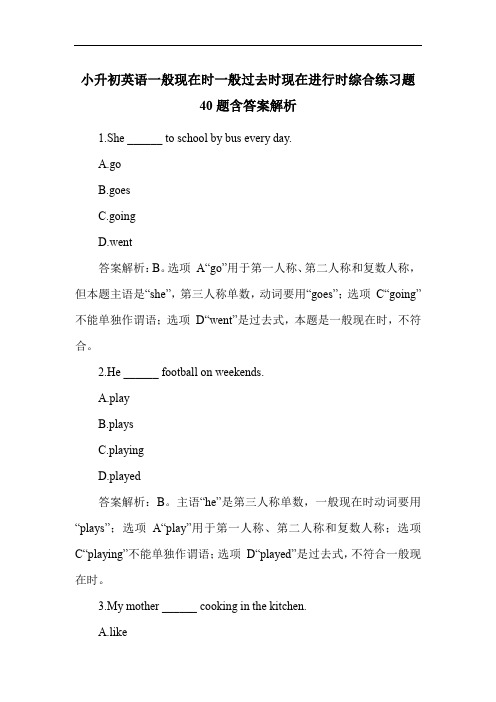
小升初英语一般现在时一般过去时现在进行时综合练习题40题含答案解析1.She ______ to school by bus every day.A.goB.goesC.goingD.went答案解析:B。
选项A“go”用于第一人称、第二人称和复数人称,但本题主语是“she”,第三人称单数,动词要用“goes”;选项C“going”不能单独作谓语;选项D“went”是过去式,本题是一般现在时,不符合。
2.He ______ football on weekends.A.playB.playsC.playingD.played答案解析:B。
主语“he”是第三人称单数,一般现在时动词要用“plays”;选项A“play”用于第一人称、第二人称和复数人称;选项C“playing”不能单独作谓语;选项D“played”是过去式,不符合一般现在时。
3.My mother ______ cooking in the kitchen.A.likeB.likesC.likingD.liked答案解析:B。
“my mother”是第三人称单数,一般现在时动词用“likes”;选项A“like”用于第一人称、第二人称和复数人称;选项C“liking”不能单独作谓语;选项D“liked”是过去式,不符合。
4.We ______ books in the library.A.readB.readsC.readingD.readed答案解析:A。
“we”是复数人称,一般现在时动词用原形“read”;选项B“reads”用于第三人称单数;选项C“reading”不能单独作谓语;选项D“readed”错误表达,read 的过去式还是read。
5.They ______ TV in the evening.A.watchB.watchesC.watchingD.watched答案解析:A。
“they”是复数人称,一般现在时动词用原形“watch”;选项B“watches”用于第三人称单数;选项C“watching”不能单独作谓语;选项D“watched”是过去式,不符合。
小学英语小升初《四大时态》专项练习和答案(分别编排)

小升初英语四大时态专项练习班级考号姓名总分一、一般现在时一、写出下列动词的第三人称单数形式。
eat read do take washwatch have carry study f lycatch go have cook looksing teach like get come play二、用单词的正确形式填空:1. Mike ___________ (do) his homework every day.2. There ____________ (be) some water in the glass.3. We like ____________ (play) basketball after class.4. I like singing. I often ____________ (listen) to the music in the evening.5. My grandma ___________ (watch) TV every day.三、选择最佳的答案:1. ____Alice often play the piano. No, she _____.A. Do; doB. Does; doesC. Does; doesn\\\\'t2. ___ your penfriend __ in Beijing?A. Do; liveB. Do; livesC. Does; live3. Tom and Mike __ very excited, they will take a trip.A. isB. areC. am4. I like ________ very much. What about you?A. danceB. dancedC. dancing5. I can’t find my pen. Let me __.A. go and ask herB. go and ask hersC. go and ask she6. Fangfang is a good student. She ____maths.A. does good atB. well do itC. is good at7. The kite ____ a bird. A. look like B. is looking C. looks like8. Bill and I ___ good friends.A. isB. areC. am9. Sandy often ___ his homework on Sundays .A. doB. doesC. did10. What do you usually do on the weekend? I __________.A. went swimmingB. go swimmingC. visited grandparents11. What do you usually do on your holiday?A. saw elephantsB. sing and danceC.took picture12. I ____ a student. I go to school ____bus every day.A. is; byB. am; onC. am; by13. I ____ a brother. She ____ a sister.A. have; hasB. has; hasC. have; have14. You ____ a student. He ____ a teacher.A. is; isB. are; isC. are; are15. He always _____ football games.A. watchesB. watchC. doesn\\\\'t16. My best friend _____ shells.A. collectsB. collectC. often17. She doesn’t _____ listening to the music.A. oftenB. likeC. likes18. My mother and I ___ always watch romantic films.A. doesn’tB. don’tC. do19. ---When _____ he get home on Friday?----He gets home at four on Friday.A. doB. doesC. did二、现在进行时一、写出下列单词的现在分词:do play dance sitmake swim jump cookclean watch come readeat write sing gorun fly catch help二、用单词的适当形式填空:1. look! Chen Jie and Mike are ___________(sing)now.2. The small bear is ________ (climb) the tree.3. Mike is ________ (draw) picture.4. She is ________ (do) the dishes.5. My brother is ________ (make) kites.6. My father is ________ (read) a newspaper in living room.7. Ted is __________(answer) the phone.8. My uncle is ________ (drive) a car.9. The students are ________(listen) to their teacher carefully.10. Chen Jie is _________(wash) clothes.三、选择正确答案1. Every one ____ to their teacher in the classroom.A. are listeningB. is listeningC. listen2. They are singing and ___ together at the party now.A. danceB. dancedC. dancing3. Listen! The birds ____.A. is singingB. are singC. are singing4. Look! The kite ___ in the sky. A. fly B. flies C. is flying5. They ____ riding a forse. A. is B. are C. am6. Kate ____ playing chess. A. am B. is C. are7. Are you washing clothes?A. Yes, you areB. Yes, I amC. No, I am8. Is he ____ TV?Yes, he is. A. watch B. watching C. not9. ____ they taking pictures.? Yes, they are.A. AmB. BeC. Are10. It’s 10 o’clock. Ben _____ TV in the bedroom.A. watchB. is watchingC. watches四、根据中文填空。
小升初语法易错动词四大时态(专项训练)人教PEP版英语六年级下册

六年级英语小升初语法易错动词四大时态综合训练卷班级: 姓名: 得分:一、基础训练1.[基础]按要求写出下列单词的正确形式。
(1) is(过去式) (9) do(三单)(2) like(三单) (10) swim(现在分词)(3) study(过去式) (11) play(过去式)(4) see(现在分词) (12) can(过去式)(5) think(过去式) (13) go(过去式)(6) buy(过去式) (14) dish(三单)(7) wash(三单) (15) have(现在分词)(8) run(三单)2.[be动词]用be动词的正确形式填空。
(1)I from China, But my friends, Lily and Lucy, from America.(2) It sunny today, but it was rainy yesterday. Tomorrow, it will snowy(3) My parents young twenty years ago. Now, they old. But I love them.(4)I active now. But three years ago, I very shy.(5)I want to a teacher, because my parents both teachers.(6)—— Jack from Beijing? ——No, he3.[助动词、情态动词]用do或will 的正确形式填空。
(1) What your brother do at weekends?——He plays basketball with his friends.(2) What you do last Sunday? ——I visited the Great Wall(3) When you go to London? ——Tomorrow morning.(4) you your homework yesterday? ——Yes, I(5) you go to the cinema with me next Sunday?——No, I4.[应用]用所给词的适当形式填空。
(word完整版)小升初四大时态及习题

英语四大时态总复习一般现在时一、一般现在时的形式以及定义二、一般现在时的基本用法1. 表示事物的性质、特征以及经常性的行为,常与always, often, usually, every day等词连用。
Tom usually comes to school late. Tom 经常上学迟到。
2. 表示客观事实和普遍真理。
The sun rises in the east. 太阳从东方升起。
3. 用在格言、谚语中。
No pains, no gains.不劳而获。
一般过去时一、一般过去时的定义以及形式二、一般过去时的基本用法1. 表示在过去的时间里发生的动作或存在的状态,常与yesterday, last night, several years ago等连用。
I took a bus to school last Friday.上周五我坐公交车去上学。
2. 表示在过去的某段时间里,经常或反复发生的动作或状态。
They had a walk after supper last year. 他们去年经常晚饭后散步。
一般将来时一、一般将来时的定语以及形式二、一般将来时的基本用法1. 表示将来某个时间要发生的动作或状态,常与将来的时间状语tomorrow, next week等连用。
She will be back tomorrow.她明天就回来。
2. 表示将来某一时间内经常发生的动作或状态。
We’ll have a test every Monday this year. 今年的每一个周一我们都有考试。
巧学妙计Be going to 指当前已计划过或思考过的意图和打算;will/ shall 表示未事先思考或未计划的意图。
Be going to 还可以表明马上要发生,而will则表明说话者的观点、主观意识。
I’m going to visit mu aunt this week. 我打算这周去看望姑姑。
小升初四大时态题目+答案

小升初四大时态易错专项练习+对应答案一般现在时易错练习A.句中有with时,尤其放在主语后面,谓语动词只看主语B. what,who做句子的主语时,要将其看成第三人称单数C.根据回答判断时态,若回答是does/do,时态一般现在时D.若句子是事实真理,用一般现在时E.与祈使句区别开来,学会not be的用法1. Tom with his friends ____(fly) kites over there every morning.2. Mary with her brother _(fly) kites in the park every weekend.3. Millie,_____(not) be afraid of snakes.4. Millie __(not be) afraid of snakes.5. The teacher said that the light _____(travel) faster than the sound.6._ Tommy with his parents _(shop) on Sundays?7. My uncle with his children __(fly) kites on Sunday mornings.8. Mike,with his family members,__(water) the flowers in the garden now.9. It's7o'clock. David ___(brush) his teeth10. Who __ send) you to school every day?11. What ___(make) our city clean and tidy?12. We knew that the sun ______(rise) from the east.13.---__ she __(walk) to school?---No,she doesn't14. My father always _____(wear) black cothes.15. Millie,___(not read) in the sun. It's bad for your eyes.16. Look!Everyone in the classroom __(have)a book in their hands.17. Tom,_(not be) late for school again.18. You are wrong. My classmate Lucy and I____(not be) in the reading club.19. He _____(not be) good at sports.20. Who often _____(help) you with your Maths?一般过去时易错练习1.---Who _(speak) at the meeting on Friday!---Millie did.2. she _(buy)a book the day before yesterday.3. David ___(put) the books in the bag and left the classroom.4. She ____(think) that she was late for school.5._ Tom __(ride) to school yesterday?6. Who ______(teach) you English last year?7. My parents ____(buy) me a new bike as my birthday present last week.8. Who ______(teach) you to ride a bike when you were a child?9. Millie _(not do) homework yesterday.10. My father read a book in the room,and I____(do) my homework in the study.11. At last,I_____(come) home at 10:00 PM.12. My father ____(take) this photo in Japan about two years ago.13. Tom __(not write)a letter to his parents yesterday evening.14. My cousin ___(put) up a tent near a lake 10 minutes ago.15. Lucy _(go) to the City Museum last Sunday.16. My friend,Carol,___(study) for the math test last night.17. She ____(stay) at home and __(do) some cleaning after she came back from work.18. She _(not visit) her aunt last weekend.19.____ she ___(practice) her guitar yesterday?20.I__(have) an exciting party last weekend.一般将来时易错练习A. there be的一般将来时:there will be/there is are/going to be;注意不能出现have一词B. in+一段时间:in 3 hours;in 2 days等用将来时C.根据回答来使用will或者be going toD. if表达如果,主将从现1. My father _(go) to Shanghai next week,won't he?2. She ______(come) back to HK in 3 days.3.____ Lily _(play) with her friends tomorrow? No,she isn't.4.__ there _(be) two football matches in two weeks,aren't there?5.--Who __(teach) you maths?----Mr Wang will.6. The members of Running Man _(arrive) at the airport in half an hour.7. There _____(be)a football match tomorrow.8.---__ there ___(be)a football match tomorrow?----Yes,there will.9. My father ___(go) to Shanghai next week.10._ we meet at the school gate tomorrow?11. We'll go to the park if it _ rain tomorrow.A. don'tB. doesn'tC. won'tD. isn't12.—If my uncle ____ next weekend,we __with him.—Sounds great!A. will come;will go skiingB. will come;goes skiingC. comes;will go skiingD. comes;goes ski13.―What will you do if it _ tomorrow?14.—I will stay at home and watch the match on TV.A. rainB. rainsC. will rainD. is raining15.I'm sorry I'm very busy now.IfI___ time,I___ come to see you.A. have,wouldB. had,willC. were,willD. have,will16. James with the Greens _the White Tower Park if it __ tomorrow.A. are going to;isn't rainyB. are going to;doesn't rainC. is going to;won't rainD. is going to;isn't rainy17.--There ____a bird show this afternoon. Shall we go to the zoo to watch it?---Good idea.A. will haveB. is going to haveC. will beD. is going to18.---Will there __avolleyballmatch on Sunday?---Yes. There __ twovolleyballmatches on that day.A. be;are going to beB. have;are going to beC. have;are going to haveD. be;are going to have19. There ____ helping hands”meeting this Sunday morning.A. is;atB. will be;atC. is going to be;/D. is going to have;on20.---There __a parents'meeting on Tuesday afternoon,isn't there?---Yes. But my parents don't have time for it.A. will haveB. will beC. is going to haveD. is going to be现在进行时易错练习A. have作为有的意思来讲时,没有进行时。
PEP版英语六年级下册小升初专题卷(含答案)时态四:一般过去时
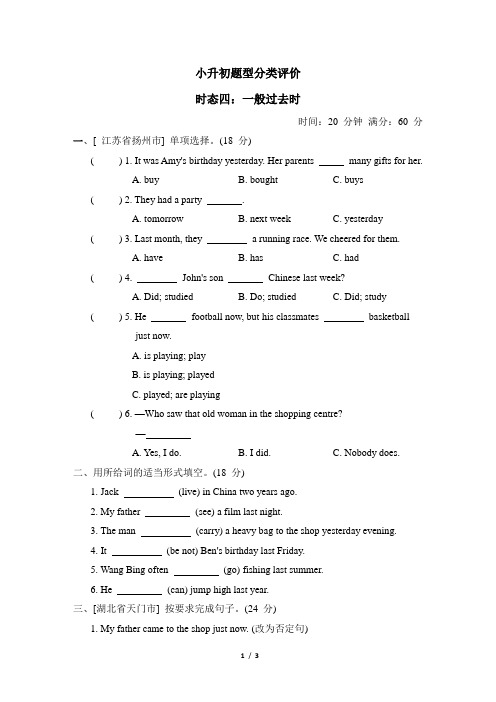
小升初题型分类评价时态四:一般过去时时间:20 分钟满分:60 分一、[ 江苏省扬州市] 单项选择。
(18 分)( ) 1. It was Amy's birthday yesterday. Her parents many gifts for her.A. buyB. boughtC. buys( ) 2. They had a party .A. tomorrowB. next weekC. yesterday( ) 3. Last month, they a running race. We cheered for them.A. haveB. hasC. had( ) 4. John's son Chinese last week?A. Did; studiedB. Do; studiedC. Did; study( ) 5. He football now, but his classmates basketball just now.A. is playing; playB. is playing; playedC. played; are playing( ) 6. —Who saw that old woman in the shopping centre?—A. Yes, I do.B. I did.C. Nobody does.二、用所给词的适当形式填空。
(18 分)1. Jack (live) in China two years ago.2. My father (see) a film last night.3. The man (carry) a heavy bag to the shop yesterday evening.4. It (be not) Ben's birthday last Friday.5. Wang Bing often (go) fishing last summer.6. He (can) jump high last year.三、[湖北省天门市] 按要求完成句子。
- 1、下载文档前请自行甄别文档内容的完整性,平台不提供额外的编辑、内容补充、找答案等附加服务。
- 2、"仅部分预览"的文档,不可在线预览部分如存在完整性等问题,可反馈申请退款(可完整预览的文档不适用该条件!)。
- 3、如文档侵犯您的权益,请联系客服反馈,我们会尽快为您处理(人工客服工作时间:9:00-18:30)。
小升初英语四大时态复习讲解及真题专项
练习含答案
一、重点讲解
考点一:动词的基本形式
1.动词原形(分实义动词、助动词、系动词、情态动词4类)
(1)助动词(do/does/did)紧随其后的动词用原形;
(2)情态动词(can/could/should/must/would/will/shall/maybe)紧随其后的动词用原形;
(3)祈使句(表示命令式的语句)用原形;
Eg: Open the door, please.
(4)固定搭配。
let sb do sth/help sb do sth/make sb do sth/why not do sth.
2.第三人称单数(用于一般现在时)
变形规则:
(1)一般在动词词尾加s。
如: work→works、read→reads、look →looks、live→lives。
(2)以ch、sh、s、x结尾的,在词尾加es。
如: catch→catches、finish
→finishes、guess→guesses、。
(3)以o结尾的动词,分2种情况:有生命的加es,如:hero,tomato,
potato;没有生命的加s,如:radio,photo。
(4)以辅音字母加y结尾的动词,变y为ies。
如: fly→flies、study →studies、carry→carries.
(5) 不规则变化。
如: have→has ,are→is,were→was
3.现在分词(用于现在进行时)
变形规则:
(1)一般在动词后加ing。
如: work→working、read→reading、look →looking、wait→waiting。
(2)以不发音的e结尾的动词,去掉e,再加ing。
如: smile→smiling、move→moving、take→taking、write→writing。
(3)以重读闭音节结尾的且词尾只有一个辅音字母的,双写这个辅音字母加ing。
如: sit→sitting、stop→stopping、cut→cutting、run →running、swim→swimming.
(4)少数几个以ie结尾的动词,将ie改为y加ing。
如die-dying、lie-lying(不过小学阶段考不到。
)
用法:
(1)固定搭配。
be good at/ like/love / what about...
(2)表示课程。
Swimming/Dancing/ lesson
(3)表示标志。
No Parking/ No Smoking
(4)用在be动词后面。
(5)用在介词后面。
(6)动名词开头作主语。
Eg: Swimming is good for our health.
(7)Listen/ Look 等表达正在进行的动作。
4.过去式(用于一般过去时)
变形规则:
(1) 一般加ed。
如: work→worked, look→looked、wait→waited、jump →jumped。
(2) 以e结尾的动词直接加d。
如: smile→smiled、move→moved、close→closed、agree→agreed。
(3)以辅音字母加y结尾的动词,先变y为ied。
如: study→studied、carry→carried。
(4)以“辅元辅”结尾的动词,双写这个辅音字母再加ed。
如:
stop→stopped、drop→dropped、prefer→preferred。
(5)不规则变化。
如: go→went、see→saw、sing→sang、sleep→slept。
考点二:四大时态
(一)一般现在时(三单要用三单形式)
1、用法
(1)表示经常或习惯性的动作或行为,一般与always、sometimes、often、usually、never 等词连用。
Eg: My mother often gets up at 6 o’clock.
(2)表示现在的状态、能力、性格、个性。
Eg: My father teaches Maths.
(3)表示普遍真理或客观事实。
Eg: The earth moves around the sun.
2、标志词
always、sometimes、often、usually、never;twice a week; every/each year/month/week/day; on Sundays等。
(二)现在进行时(动词ing形式)
1、用法
(1)表示说话时正在进行或发生的动作。
Eg: He is doing his homework now.
(2)表示即将发生的动作。
能这样用的动词有do、come、go、leave、start、arrive、return 等表示位置移动的动词。
Eg: New Year's Day is coming.
2、标志词
now;right now;look!;Listen!;these days等。
(三)一般过去时(过去式)
1、用法
(1)一般过去时表示过去某个时间发生的动作或存在的状态。
常与时间状语yesterday、this morning、last week/month/ year、ago、just now等连用。
Eg: The old man lived in New York three years ago.
(2)表示过去一段时间内经常或反复的动作或习惯、状态。
Eg: Mrs White always carried an umbrella.
2、标志词
yesterday; the day before yesterday; this morning; last night/week/month/ year; ago/long long ago; just now; once upon a time; that day; then(那时);just now(刚刚);in +1999等过去的年份。
(四)一般将来时(动词原形)
1、用法
(1)表示将来某个时间将要发生的动作,常与表示将来的时间状语tomorrow、next year、in two days、in the future、some day等连用。
Eg: The sky is getting dark. It is going to rain.
(2)表示将来某一时间内经常发生的动作或状态。
Eg: I will come and see you every weekend next year.
2、小学阶段一般将来时有两种形式:
(1)主语+will +动词原形
(2)主语+ be going to +动词原形
3、标志词
tomorrow; the day after tomorrow; next day/week/month/year; in the future; some day; in +一段时间(在一段时间以内将要干什么);this evening/ week/month/year;before long(不久以后)
二、专项练习
(一)单项选择
( ) 1. (北京市东城区) I usually to school at 7 :30.
A. go
B. goes
C. went
( ) 2. (武汉市青山区) Mike often TV in the evening.
A. watch
B. watches
C. watched
( ) 3. (佛山市顺德区) Look! The plane over the building.
A. is flying
B. flying
C. flies
D. is going to flying
( ) 4.(广州市南沙区) It's now.
A. raining
B. rains
C. rain
D. rained
( ) 5.(厦门市思明区) Listen! Kelly an English song the classroom.
A. sing; in
B. sings ;in
C. is singing; in
( ) 6.(上海市) The students trees yesterday afternoon.
A. planted
B. plants
C. plant
D. planting
( ) 7. (温州市) My father my brother a present last Sunday.。
